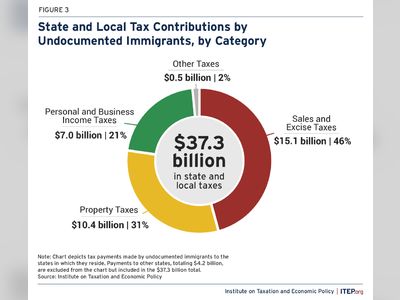
UK Negotiates Intensively on US Tariffs Amid Economic Turmoil
As a 10% tariffs on UK goods comes into effect, the UK government considers options in reaction to Donald Trump's trade policies.
The UK government is currently engaged in intensive negotiations with the United States over tariffs, as officials weigh potential retaliatory actions.
Exchequer Secretary to the Treasury, James Murray, confirmed efforts to secure a deal since Prime Minister Keir Starmer's visit to Washington earlier this year, stating, "We've been negotiating intensively to secure a deal… and we're continuing those negotiations at pace."
The backdrop to these negotiations is the announcement of a 10% tariff on UK goods, set to take effect Saturday.
This tariff follows a substantial decline in the UK's FTSE 100 index, which dropped by 0.68% to 8,416.71 on Friday, marking its lowest point since January.
The decline appears to reflect broader concerns regarding the impact of the tariffs on the UK economy, as banking and mining stocks faced significant losses.
Foreign Secretary David Lammy expressed regret over what he termed the "return to protectionism" in the US, indicating that the imposition of tariffs could have detrimental effects on British consumers and the economy.
Lammy noted, "We need to ensure the national interests of the British people are respected, especially regarding their financial well-being."
The FTSE 100 experienced its steepest drop since March 2020, losing 419.75 points, or 4.95%, on Friday.
This followed a turbulent trading week characterized by fears of escalating trade tensions.
Global markets reacted negatively, with the Dow Jones Industrial Average also suffering a significant fall, dropping 5.5% on Friday.
Following the tariff announcement, UK automotive giant Jaguar Land Rover announced it would "pause" shipments to the United States as it assesses the effects of the new tariffs.
The company exports nearly a quarter of its annual production to the US, making it especially vulnerable to the tariff imposition.
Notably, global responses to Trump's tariff strategy have varied.
China announced a matching 34% tariff on US goods, further escalating tensions.
Economists predict that the trade war could ultimately hinder economic growth on both sides of the Pacific, as industries grapple with increased costs.
During discussions, Starmer communicated with leaders from Australia and Italy, who collectively acknowledged the potential economic fallout of a trade war, agreeing that such a conflict would be damaging for all involved.
Meanwhile, Starmer's government faces increasing scrutiny over its economic policies in light of the newly imposed tariffs.
Analysts have estimated that close to $5 trillion (£4 trillion) was erased from global stock market values following Trump's recent tariffs.
As the UK navigates these challenges, the government is consulting with businesses regarding possible countermeasures, while also emphasizing a desire to achieve a favorable trade agreement with the US. Starmer has stated his commitment to protect British jobs and industry amid a shifting global economic landscape.
Exchequer Secretary to the Treasury, James Murray, confirmed efforts to secure a deal since Prime Minister Keir Starmer's visit to Washington earlier this year, stating, "We've been negotiating intensively to secure a deal… and we're continuing those negotiations at pace."
The backdrop to these negotiations is the announcement of a 10% tariff on UK goods, set to take effect Saturday.
This tariff follows a substantial decline in the UK's FTSE 100 index, which dropped by 0.68% to 8,416.71 on Friday, marking its lowest point since January.
The decline appears to reflect broader concerns regarding the impact of the tariffs on the UK economy, as banking and mining stocks faced significant losses.
Foreign Secretary David Lammy expressed regret over what he termed the "return to protectionism" in the US, indicating that the imposition of tariffs could have detrimental effects on British consumers and the economy.
Lammy noted, "We need to ensure the national interests of the British people are respected, especially regarding their financial well-being."
The FTSE 100 experienced its steepest drop since March 2020, losing 419.75 points, or 4.95%, on Friday.
This followed a turbulent trading week characterized by fears of escalating trade tensions.
Global markets reacted negatively, with the Dow Jones Industrial Average also suffering a significant fall, dropping 5.5% on Friday.
Following the tariff announcement, UK automotive giant Jaguar Land Rover announced it would "pause" shipments to the United States as it assesses the effects of the new tariffs.
The company exports nearly a quarter of its annual production to the US, making it especially vulnerable to the tariff imposition.
Notably, global responses to Trump's tariff strategy have varied.
China announced a matching 34% tariff on US goods, further escalating tensions.
Economists predict that the trade war could ultimately hinder economic growth on both sides of the Pacific, as industries grapple with increased costs.
During discussions, Starmer communicated with leaders from Australia and Italy, who collectively acknowledged the potential economic fallout of a trade war, agreeing that such a conflict would be damaging for all involved.
Meanwhile, Starmer's government faces increasing scrutiny over its economic policies in light of the newly imposed tariffs.
Analysts have estimated that close to $5 trillion (£4 trillion) was erased from global stock market values following Trump's recent tariffs.
As the UK navigates these challenges, the government is consulting with businesses regarding possible countermeasures, while also emphasizing a desire to achieve a favorable trade agreement with the US. Starmer has stated his commitment to protect British jobs and industry amid a shifting global economic landscape.











